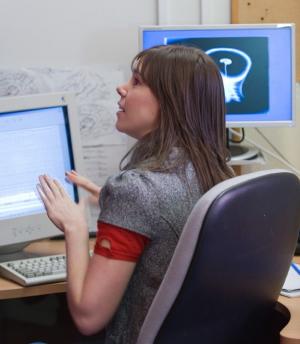MAPrc Grant Success
MAPrc has been highly successful with grants being awarded from a number of different funding agencies....
MAPrc awarded with highly competitive Alfred Health Grants
MAPrc researchers have been awarded one of three highly competitive Alfred Health grants (valued at $485,817 over three years) to investigate the predictors of antidepressant response to Transcranial Magnetic Stimulation.
One of the only substantially new treatments developed in recent years for treatment resistant depression has been repetitive Transcranial Magnetic Stimulation (rTMS). As participation in rTMS treatment involves considerable time and resource commitment, it is essential to be able to identify patients who are more or less likely to respond. This research aims to provide a practical and clinically useful approach to predicting antidepressant response to rTMS treatment.
Successful Australian Research Council Discovery Grant
Congratulations to Dr Peter Enticott who was a successful recipient of the Australian Research Council Discovery Grant for ‘What is the functional significance of mirror neurons? Contrasting the adaptation and association models of the mirror neuron system’. Dr Enticott faced a highly competitive selection process and was awarded $155,000, which demonstrates the outstanding research he his undertaking at MAPrc.
Rebecca Segrave awarded NHMRC Early Career Researcher Health Professional Fellowship

Deep Brain Stimulation for Treatment Resistant Major Depression: Neural Correlates and Neuropsychological Outcomes
Major depression is a prevalent and devastating mental illness. While there are numerous pharmacological and psychological antidepressant therapies available, many patients do not respond to these treatments. Deep brain stimulation (DBS) is emerging as a potential treatment option for individuals with chronic severe treatment resistant major depression. The current project will investigate the cognitive and neurobiological outcomes associated with the use of DBS to treat depression.
Small Grants Scheme Awarded
Rebecca Segrave - $52,604
Cognitive control training for major depression: application, evaluation and augmentation.
Depression is a highly prevalent, debilitating mental illness. Many depressed individuals fail to respond to available pharmacological and psychological therapies; there is a significant need to develop novel antidepressant treatment approaches. We now know that the cognitive and emotional symptoms of depression interact with each other, and these interactions contribute to the length and severity of depressive episodes. Cognitive control training (CCT) is a promising novel treatment approach, targeting cognitive symptoms to improve both cognition and emotional functioning in depression. This study trials CCT, and investigates whether its potential can be further enhanced using a form of mild brain stimulation.


